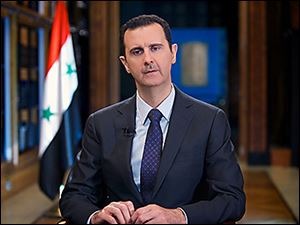
EDITORIAL
Defusing Syria
7/1/2000
Assad
An agreement among the permanent members of the United Nations Security Council and the Syrian government is another step leading the United States and the rest of the world away from greater involvement in the civil war in Syria, which was at risk because of the use of chemical weapons there.
America is no longer threatening to carry out an attack on Syria, which could have endangered regional and global peace. President Obama’s threat of such an attack, to the point of seeking congressional approval for one, was a catalyst in prompting Russia, the Bashar Assad regime in Damascus, and other parties to seek a negotiated resolution of the chemical-weapons issue.
The Security Council resolution does not provide explicitly for measures against Syria if it does not live up to its part of the bargain. But the U.S. threat of military action remains in the background if the process goes wrong.
So far, Syria is showing good faith in carrying out its end of the deal. It has provided information about its stockpile of chemical weapons and their location. What it has disclosed is apparently not at variance with information that U.S. and other intelligence-gathering bodies had on Syria’s weapons stash.
Hopes that reasonable behavior in resolving the chemical-weapons crisis would flow into negotiations on a more- general peace in Syria suffered a setback this week, as the Syrian opposition fragmented further. Militant Islamist elements broke off from what they consider to be the too-tame National Coalition of Syrian Revolutionary and Opposition Forces, based in Turkey, and the Free Syrian Army.
Instead, these groups established a new front, centered on more-radical organizations in Syria and Iraq. These elements sharply disowned the leadership of moderates in Syria.
At some point, the conclusion may become inevitable that the opposition is too divided to sit credibly across the negotiating table from Syrian government representatives. That would also discredit the idea that the participation of Iran in such a meeting could contribute to useful negotiations over Iran’s own nuclear program — another important diplomatic goal of the United States.
In the short run, though, Americans should be pleased that the chemical- weapons issue appears on its way to resolution, and that an attack on Syria has been overtaken by events. That is progress, and a diplomatic triumph.